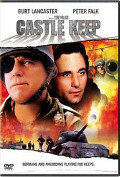
Directed by
Sydney Pollack
105 minutes
Rated M
Reviewed by
Chris Thompson


Castle Keep
One-eyed Major Falconer (Burt Lancaster) and his odd assortment of eight battle-weary soldiers are wandering through the Ardennes Forest somewhere between their own lines and the advancing German army when they stumble upon an old castle that is home to the eccentric Comte deMaldorais (Jean-Pierre Aumont). Here and in the nearby village bereft of all its menfolk, the small company find respite from the war. Sergeant Rossi (Peter Falk) acquires the local bakery along with the baker's wife; art historian, Captain Beckman (Patrick O'Neal) discovers a treasure trove of priceless artworks throughout the castle; Major Falconer is encouraged by the impotent Count to sire an heir with his beautiful young wife, Therese (Astrid Heeren) and all their stories are captured for posterity in the writings of aspiring author, Private Alistair Piersall Benjamin (Al Freeman Jnr). For a while, things are idyllic until the German troops approach and they must decide whether to surrender the artworks to the enemy, or defend the castle and risk their destruction.Although Mike Nichols Catch 22 (1970) and Robert Altman’s M*A*S*H (1970) are popular touchstones of the anti-war movement, they are pipped at the post, in my opinion, by Pollack’s lesser known but more morally perplexing film. The symbolism of culture at the film’s heart – the glorious architecture of the castle and the irreplaceably priceless artefacts it holds - perfectly represent the ideals of civilised humanity for which Falconer and his troops are fighting. So, what better dilemma to give them than a choice between destroying what they’re protecting by standing their ground or, in saving it, seeing it lost to the enemy.
Castle Keep is adapted from William Eastlake’s excellent novel of the same name and his sharply drawn characters (each chapter in the book is told in first-person by each character) are beautifully realised on screen by this terrific cast. Lancaster is at his best in this role, playing Falconer in a deadpan style with his tongue just lightly touching the inside of his cheek and Falk is a standout for his erratic and heartfelt portrayal of a man who, in the midst of all the horror, finds himself in a place he feels he’s meant to be.
There is a strong sense of the surreal in this film right from the opening image when we see the soldiers emerge ghost-like from the mist. Perhaps they are ghosts? If the war is so close, why is the only sound they hear the call of the crows from the forest? Is the whole story just a fantasy or is it really happening to them? Pollack allows these two possibilities to co-exist without ever settling on one or the other – there is no “Dorothy, wake up!” moment. What there is, though, is a confronting climax which resists the temptation for a neat or happy ending to the story. When the credits roll, the dilemma at the heart of the film is just as powerful as ever.
Want something different?





